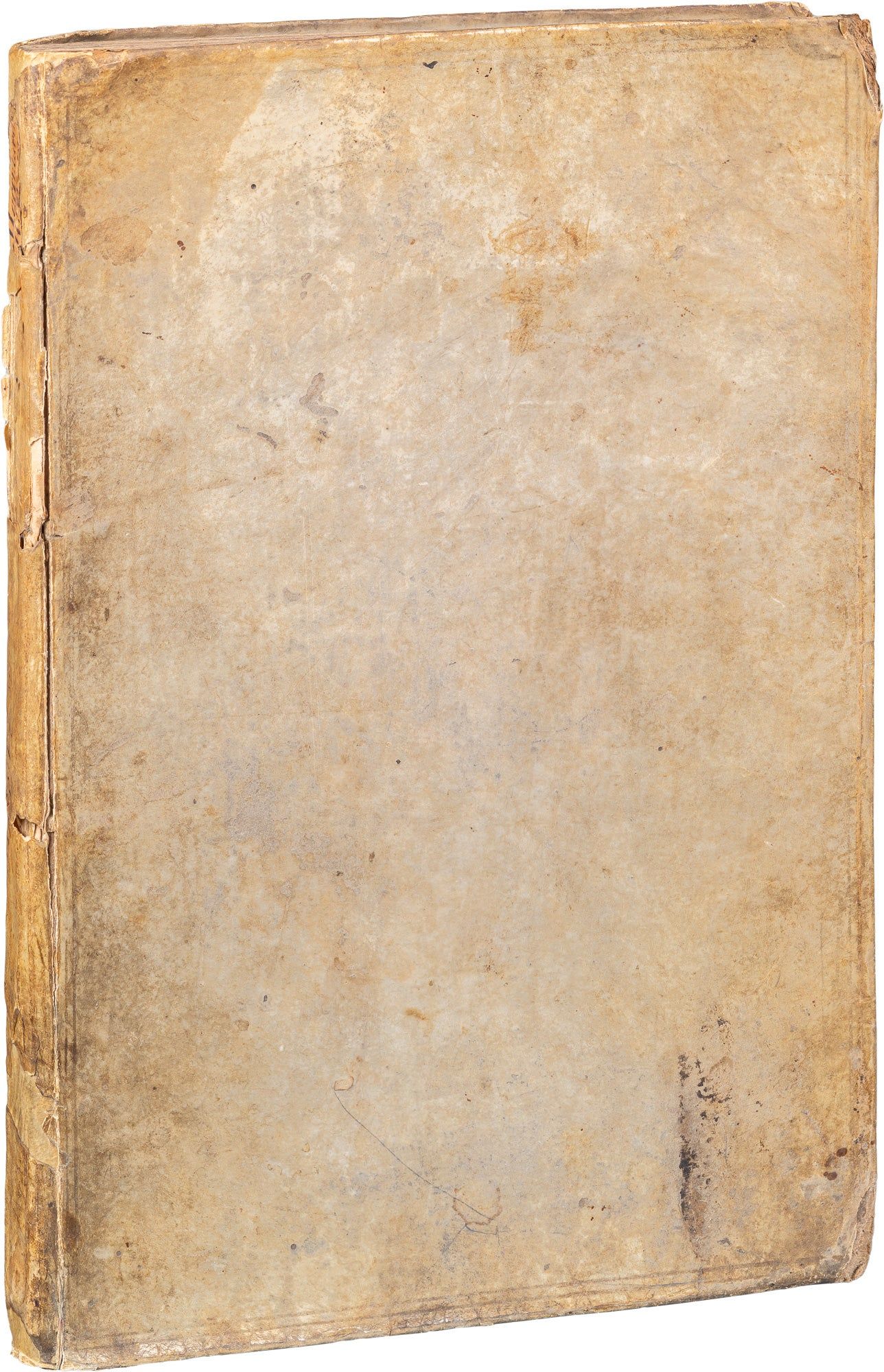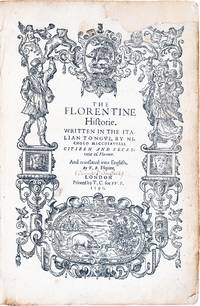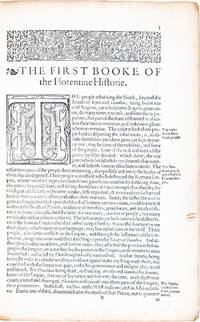The Florentine Historie
- SIGNED
- London: Printed by T.C. [Thomas Creede] for W.P. [William Ponsonby], 1595
London: Printed by T.C. [Thomas Creede] for W.P. [William Ponsonby], 1595. First Edition. Very good. First edition in English. Contemporary (likely original) vellum, Contemporary (likely original) vellum, fragment of the original printed paper label on spine. Woodcut engraved ornamental title page, the upper right corner chipped and replaced with paper appropriated from the lower left corner of the rear free endpaper, otherwise a very good, complete (222 pages) copy, and this is an unexpected binding to find surviving on this book. Engraved headpieces and tailpieces. Very good. Machiavelli's most advanced intellectual development and his most sustained engagement with the problem of political transformation over time. Commissioned by Cardinal Giulio de' Medici in November 1520, this work emerged from Machiavelli's desire to return to political life following his exile after the fall of the Florentine Republic in 1512.
The work follows humanist historiographical traditions by organizing narrative into books with crafted speeches, yet unfolds within a broader philosophical framework examining the struggle between virtue and fortune. Unlike his earlier political treatises, the “Histories” demonstrates Machiavelli's sophisticated understanding of historical periodization, tracing Florence's evolution from medieval commune through republican greatness to factional decline. Central to the work is Florence's destructive factionalism, which Machiavelli contrasts with the productive conflicts of ancient Rome, showing how internal divisions left Florence fragmented and morally compromised.
Rather than depending uncritically on his sources, Machiavelli consciously appropriated and subverted earlier chroniclers, creating a confrontation between his analytical language and traditional historical narratives. This approach enabled him to examine political causation through secular analysis, departing from providential interpretations in favor of understanding how individual agency and circumstantial necessity interact within historical processes.
The "Histories" reflects long-standing interests integral to Machiavelli's political theory and his persistent critique of Florentine politics, building upon his earlier historical writing including the 1504 "Decennale." The narrative pivots around Cosimo de' Medici's return from exile in 1434 and includes vivid character sketches, particularly of the Medici family, alongside subtle critiques of the Church.
Thomas Bedingfield's 1595 English translation brought Machiavelli's historical methodology to Tudor England during a period of intense political transformation under Elizabeth I. The translation's publication positioned Machiavelli within English humanist literary culture, making his analytical approach to historical causation accessible to English political theorists grappling with questions of statecraft and national identity.
The enduring importance of the "Florentine Histories" lies in its demonstration of how historical analysis can serve as a laboratory for understanding political development. Through his examination of Florence's cycles of rise and decline, Machiavelli created a model for historical writing that influenced subsequent historians from Guicciardini through the Enlightenment, establishing principles for analyzing the mechanisms of political transformation that continue to inform historical and political scholarship.
The work follows humanist historiographical traditions by organizing narrative into books with crafted speeches, yet unfolds within a broader philosophical framework examining the struggle between virtue and fortune. Unlike his earlier political treatises, the “Histories” demonstrates Machiavelli's sophisticated understanding of historical periodization, tracing Florence's evolution from medieval commune through republican greatness to factional decline. Central to the work is Florence's destructive factionalism, which Machiavelli contrasts with the productive conflicts of ancient Rome, showing how internal divisions left Florence fragmented and morally compromised.
Rather than depending uncritically on his sources, Machiavelli consciously appropriated and subverted earlier chroniclers, creating a confrontation between his analytical language and traditional historical narratives. This approach enabled him to examine political causation through secular analysis, departing from providential interpretations in favor of understanding how individual agency and circumstantial necessity interact within historical processes.
The "Histories" reflects long-standing interests integral to Machiavelli's political theory and his persistent critique of Florentine politics, building upon his earlier historical writing including the 1504 "Decennale." The narrative pivots around Cosimo de' Medici's return from exile in 1434 and includes vivid character sketches, particularly of the Medici family, alongside subtle critiques of the Church.
Thomas Bedingfield's 1595 English translation brought Machiavelli's historical methodology to Tudor England during a period of intense political transformation under Elizabeth I. The translation's publication positioned Machiavelli within English humanist literary culture, making his analytical approach to historical causation accessible to English political theorists grappling with questions of statecraft and national identity.
The enduring importance of the "Florentine Histories" lies in its demonstration of how historical analysis can serve as a laboratory for understanding political development. Through his examination of Florence's cycles of rise and decline, Machiavelli created a model for historical writing that influenced subsequent historians from Guicciardini through the Enlightenment, establishing principles for analyzing the mechanisms of political transformation that continue to inform historical and political scholarship.




